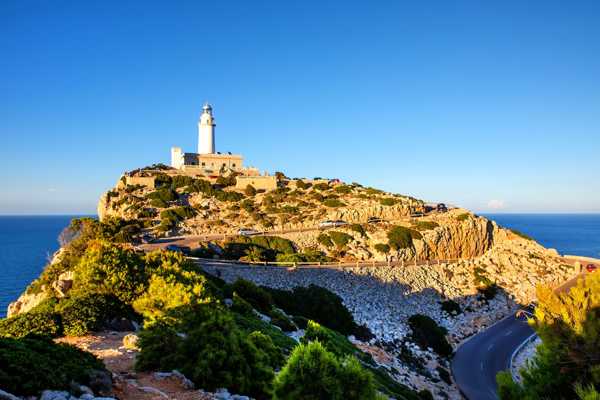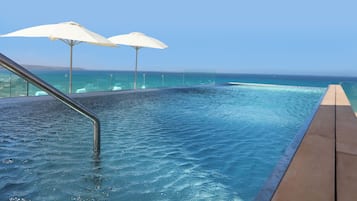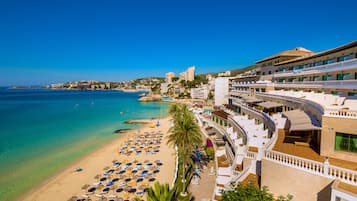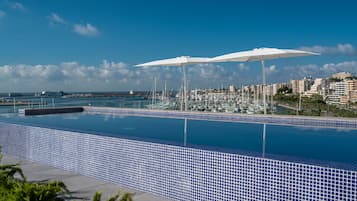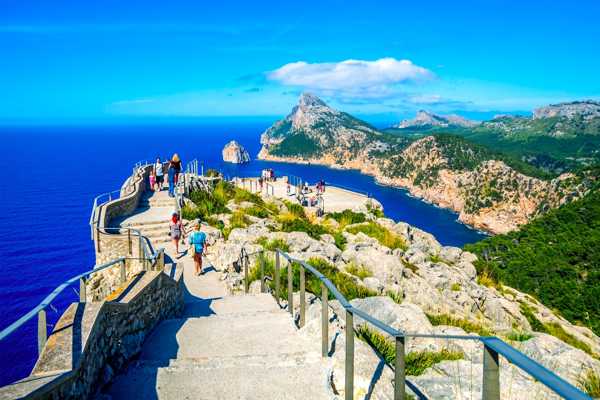Small towns in Mallorca exude old-world charm and local hospitality, great for escaping the island’s tourist crowd. Many of these settlements have been around since medieval times, some hidden in the Serra de Tramuntana and others along the pristine Mallorcan coastline.
Mallorca's small towns and villages make excellent day-trip destinations from the city of Palma. You can find a mix of Spanish, Moorish, and Ancient Roman structures, as well as quaint shops, centuries-old wineries, and local restaurants. Travel back in time by planning a visit to these must-visit small towns in Mallorca.
- 1
Valldemossa
Gorgeous valley views and stone alleyways

- Avontuur
- Geschiedenis
- Foto
Valldemossa lies in the Serra de Tramuntana, making it Mallorca's highest town. It maintains an old-world charm, with cobblestone alleys, quaint stone houses, and vertical gardens. The town has attracted many icons over the years, including Austrian Archduke Lluis Salvado and Polish composer Frédéric Chopin.
One of Valldemossa’s most popular landmarks is the Carthusian Monastery. It was originally a monastery in 1399 but became Chopin’s winter residence between 1838 and 1839. Adventure-seekers often come to Valldemossa to hike the many peaks in the Tramuntana mountain range. If you’re up for a challenge, try the 16-km-long route to the summit of Puig des Teix for gorgeous mountain vistas.
Kaart - 2
Deià
An artistic town loved by celebrities

- Geschiedenis
- Luxueus
- Foto
Deia is a pretty coastal village on Mallorca’s west coast. It’s characterised by clay-coloured houses with deep-green shutters. Through carefully controlled urban expansions, it has retained the old-world charm and unique beauty that made poet and artist Robert Graves decide to call it his home. You can even visit his house, which has been turned into a museum to document his life in the town.
Today, Deia is still quite the artist’s hideaway, with plenty of art galleries and gift shops worth visiting. It has become a top destination for the rich and famous, including celebrities like Andrew Lloyd Webber, Princess Diana, and Kate Moss.
Kaart - 3
Fornalutx
A traditional mountain village in the Serra de Tramuntana

- Goedkoop
- Geschiedenis
- Foto
Fornalutx is a scenic village on the hillside of Mallorca’s Puig Major, in the Serra de Tramuntana mountain range. This traditional village has been around since the Middle Ages, so you’ll find many picturesque buildings lining its well-worn stone pathways. Moorish-style houses with red tile roofs, green shutters and wooden terraces are common in Fornalutx.
Fornalutx is a great place to stay if you’re planning to hike the peaks of the Serra de Tramuntana. If you’re looking for a more laidback way to enjoy the view, Fornalutx has plenty of cafes and tapas bars dotting its main square, Plaça d'España.
Kaart - 4
Sóller
A quaint seaside city famous for its wooden tram

- Stellen
- Geschiedenis
- Foto
Sóller is a picturesque town surrounded by the Serra de Tramuntana, on the northwest coast of Mallorca. It offers a quaint vibe, with narrow alleyways dotted with Spanish cottages, ice cream parlours, and cafes. You can start the day at Constitution Square (Plaça Constitució), the town’s main plaza. It hosts the 13th-century Església de Sant Bartomeu, a beautiful neo-Gothic church with spires designed by Gaudi’s student, Joan Rubid.
A must-do in Sóller is taking a trip on the vintage Tren Sóller wooden tram that runs from the city centre to Port de Sóller. The trip takes roughly 30 minutes, shuttling you through the town in beautiful wooden carriages.
Kaart - 5
Banyalbufar
Moorish architecture fronting the Mediterranean Sea

- Stellen
- Geschiedenis
- Foto
Banyalbufar is a compact village founded by the Moors in the 10th century. Surrounded by dramatic peaks of the Serra de Tramuntana, it’s known for its Moorish architecture, stone terraces, vineyards, and hiking trails overlooking the waters of the Mediterranean.
The village’s many wineries specialise in white wine made with Malvasia grape – this variety was favoured by the King of Arago in the 16th century. A historic landmark of Banyalbufar is the Torre de Ses Animes, a watchtower built to protect the town from pirate attacks. From the village centre, you can follow many signposted trails to the Serra Tramuntana coastline.
Kaart - 6
Santanyí
Enjoy a slower pace of life in this rural town

- Stellen
- Geschiedenis
- Foto
Santanyí is a rural town in Mallorca’s southeast, next to the Mondragó Natural Park. It’s known as the source of mares, a type of golden sandstone used in the construction of iconic buildings like Palma Cathedral (La Seu), the Royal Palace of La Almudaina, and Castell de Bellver.
Santanyí itself has many sandstone buildings and cobblestone streets, enclosed by the remains of a 16th-century medieval wall. It’s easy to explore the town on foot, with plenty of art galleries, tapas bars, and charming cafes concentrated around Plaça Major. From the town, you’re within a 10-minute drive of the island’s pristine beaches, including Cala Santanyí and Cala Mondragó.
Kaart - 7
Alcúdia
One of the oldest small towns in north Mallorca

- Gezinnen
- Geschiedenis
- Foto
Alcúdia is a medieval town around 54 km north of Palma de Mallorca. It was founded by the Romans in 123 BC, but you’ll find many historic landmarks dating back to the 13th century. The smallest Roman amphitheatre in Spain and the Roman Remains of Pollentia (Ruines Romanes de Pollentia) are just outside the town centre.
Alcúdia has many modern conveniences, thanks to its reputation as a holiday resort in Mallorca. Just 1.5 km southeast of the town is Port d'Alcúdia, a pedestrianised promenade lined with excellent bars, restaurants, and shops. You can enjoy the summer sun on Alcúdia Bay’s white-sand beaches like Alcúdia Beach (Platja d’Alcúdia) and Playa de Muro.
Kaart - 8
Capdepera
A mountaintop town near Mallorca’s north-eastern coast

- Stellen
- Geschiedenis
- Foto
Capdepera is known for its proximity to Mallorca’s gorgeous beaches, though there’s plenty to see in this mountaintop town as well. It was founded in 1300 AD, with fortified walls that protected its residents from pirate attacks in the 14th century. A must-see is the remains of Castell de Capdepera, located on the summit of Puig de Capdepera.
Capdepera is within a 10-minute drive of several sandy coves, including Cala Agulla and Cala Ratjada. For those seeking an all-over tan, nude sunbathing is encouraged at Cala Torta. Many of these beaches have modern facilities, such as sun lounges, umbrellas, and snack bars.
Kaart - 9
Port de Pollença
A northern Mallorca resort loved by Agatha Christie

- Avontuur
- Stellen
- Gezinnen
- Geschiedenis
- Foto
Port de Pollença attracts those looking for a summery holiday in Mallorca. The northern Mallorca town sits on the Bay of Pollença, making it a popular spot for swimming, kayaking, and fishing. Its promenade has a marina, shops, restaurants, bars, and resorts overlooking the ocean.
Hiking is a popular activity in Port de Pollença, especially the Pine Walk. The trail covers the length of D’Albercuix Beach, on the northern end of the town. A more challenging route is Mount Calvary (Puig de Calvari), which requires you to climb around 365 steps to enjoy tranquil sweeping views on its summit.
Kaart - 10
Artà
A Mallorquin village near Santuari de Sant Salvador

- Geschiedenis
- Foto
Artà lies in Mallorca’s northeast corner, at the foot of Calvary Hill. This traditional village is known for producing woven baskets and pottery, drawing many people to its craft market on Tuesdays.
Historical landmarks surround this small village, including Santuari de Sant Salvador. The 4,000-square-metre complex contains a wooden statue of the Virgin Mary and a neoclassical church dating back to 1832. Just outside Artà is Ses Païsses, one of the best-preserved Talaiotic settlements in Mallorca. The town is also a nice starting point for those looking to explore the many hiking trails in the Llevant Peninsula Nature Reserve Park.
Kaart



